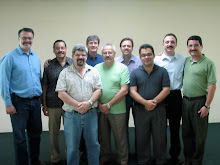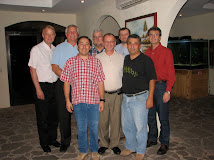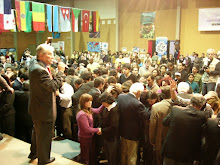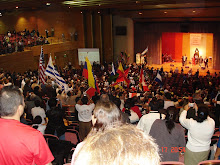 The Western Missions and their Role in the Third Millennium
The Western Missions and their Role in the Third Millennium“Join with others in following my example, brothers, and take note of those who live according to the pattern we gave you” Php. 3:17
The role the western missions will play in relationship with the new group of missionaries from the Third World (Africa, Asia and Latin America) raises some questions:
Will we help each other mutually? How to build the best missionary bridge to cooperate?, Can the structures of the Western Missions be improved, changed, or even removed?, Do all the missionary societies, churches, seminaries, or training centres have to rethink their understanding of "mission" in order to improve our missionary dialogue?, What will be the part of these missions in sending missionaries from the third world to the West and to other continents?
The apostle Paul in his letter to the Philippians gives us some answers and a model to follow. We can assert that the apostle is defining the role of the mission with the word PASSION.
1-The Gospel is the passion of the Apostle
The key passion is for the gospel. In the first chapter Paul tells us about the communion of the Gospel, speaks of what happened to him, and encourages the believers to conduct themselves in a manner worthy of the Gospel. From here we can infer that:
1.1 We should participate helping others through the cooperation
The passion for the gospel should make us participate, cooperate, share(Php.1:5) and not to compete:
- To share a common goal (2 Co. 8:23)
- To share a common experience: the persecution( Heb.10:33 and Rev. 1:9), the sufferings ( 2 Co. 1:7), the worship ( 1Co 10:16), the weakness and strength (Ph. 1:12-18),
- To share common privileges (Rom. 11:17; 1 Co 9:23)
- To share common realities (Ph. 1:7),
- To share by giving or donating (Ph. 1: 5)
This is the way the Philippians shared in the "partnership in the gospel" (1:5). We can speak of "communion". "Koinonia" is the word in the New Testament translated as communion, partnership, contribution, common. To participate and cooperate can be used with a wide range of meanings, but the word "common" in doing and being is the thread that unites them all.
What is very clear is the idea that to share something, an enterprise, a purpose, or an experience, the money or whatever should be shared. Also that which is shared first, in the context of the church, is faith. What comes from the koinonia of faith is the koinonia of work.
Thus sharing faith comes first and defines the practical co-operation. But the shared faith MUST lead to practical participation and this participation at work has concrete consequences.
In the case of Paul and the Philippians, you could see the concrete results of the co-operation:
- constant gratitude (1:3)
- constant intercession by Paul for the Philippians (1:4)
- evidence of a healthy growth in grace of the church (1:6)
- a cooperation that made them participants in his ministry (1:7)
1.2 Must we help each other?
Yes, of course. We should look for each other, help each other, encourage each other, bear each others burdens, share what we have with each other, not to dominate or look for the strongest, but to serve each other because of the PASSION that we have for the gospel.
We need each other (1Co. 12:21). We are members of one another. Our problem could be in not sharing our needs and to think that we don’t need help from anyone and that there's no need to share with others. It is very difficult to trust in the person that has no weakness, the one that always wants to give but not to receive; it is difficult to trust in someone that wants to be in control.
The beauty of the incarnation is that Christ Jesus being in very nature God willingly made himself nothing to be with us. The apostle has an interesting perspective on weakness. His suffering was for Christ, not for money or to win prestige. His weakness caused the extension of the gospel. Even when there was conflict and egoism, the gospel spreads and God’s people are encouraged to preach it. Paul is arrested, suffers, in the midst of weakness he preaches even though he is in chains. The weakness of Paul highlights his motives and, as a result, the gospel is spread. (2 Co. 12:9-10)
We should ask each other: what can we do to be strong? We have to know our weakness. When we are weak then we are strong. The strongest testimony has not come from a perfect and strong church. What amazes the world is a weak and faithful church. They noted that the disciples were with Jesus because they were ordinary men (Acts 4:13). Weakness demonstrated that they were with Jesus. The association, the partnership, the collaboration, the strategic alliances can work when every church, agency, or institution recognises it’s own weakness. Each one is not just a donor but someone that also receives, it’s not only what we can give but also what we can receive. We should search ourselves those of the North as much as those from the South in the light of what the apostle says: "Because of your partnership in the gospel from the first day until now" (1:5). " all of you share in God’s grace with me" (1:7). This is the apostolate that Paul and the church share because of the PASSION of spreading the gospel to all nations (Ro 1:5, and Eph. 3:2,8).
2-The Passion of being a Servant
When we go to chapter 2, there is a unique description of Jesus as a servant. Later we have examples of other servants such as Timothy and Epaphroditus. Chapter 3 gives us a warning against bad workers, in chapter 4, Paul begs Euodia and Syntyche to agree with each other in the Lord and towards the end he gives thanks to the Philippians for their participation in the gospel. It speaks a lot about servants, of serving together and the problems there are when serve together, therefore:
2.1 We should participate incarnating the model of Christ Jesus
In chapter 2:5-11, Christ Jesus himself emerges as a model of cooperation, in his participation within Gods plan. He models the attitude we should develop in order to achieve successful partnership. We are told of the:
- unity with the plans of the father (vs.5)
- the denial of himself, in search of the achievement of the common goal (vs.6-7)
- obedience to God’s established plan (vs. 8)
- Christ Jesus is exalted (vs. 9-11). He must be exalted as a result of our attitude towards partnership.
We must understand the biblical faith based in "being", that is in the relational aspect, the incarnation of the model. First of all we belong to trinitarian community and for that reason we are trinitarian Christians. We should question ourselves about how can we reflect on this and to put into practice the love between us. First comes the relationship. To relate to one another in an authentic way. This requires of us honesty, truth, vulnerability, submission, encouragement, and work. Biblical faith not only to do with responding and believing in a message, but, it has to do with living out the message in the real world, the world of wealth and poverty, of injustice and corruption, and the world of divisions and rivalry.
It's an attitude problem. We are all rich and poor at the same time. Again the problem that lies beneath is how to relate to each other, how to incarnate the model of Christ Jesus. That’s why the apostle says if there is any encouragement from being united with Christ, if any fellowship with the Spirit (that is communion), if there is any tenderness and compassion, then be like-minded, being one in spirit or purpose, doing nothing out of selfish ambition but in humility considering others better than yourselves.
-1.jpg) 2.2 How do we build a better cooperative missionary bridge?
2.2 How do we build a better cooperative missionary bridge?In the first place the answer is that we have to relate to each other. The problem arises when we despise the relationship and this is from both sides: from the North and also from the South. We must be in agreement with the plans of our Father. (Luke 6:27-31). This agreement with Him, speaks about having the same feeling and like-mindedness. Speaks about forgiving, about humbling ourselves, about understanding our different cultures and helping each other mutually. There is no one superior and no one inferior. This unanimity speaks to us to go out together to look for those who are lost, in order to be present before others. It speaks to us of obedience at the time when I have to resolve the interpersonal and interorganisational conflicts. It means also that we should improve our communications bridge. A face to face relationship. This relationship kills email. Our problem is that to often we despise the relationship face to face. We say: why should I go? Why should I waste my time? We can give money or ask for it but if we don’t go either to the South or the North what we are despising is the face to face relationship.
Another way to improve this cooperation bridge is to keep in mind that the one that gives is not the most important. Some times we can give money, other times human resources, etc. The point is that when we sit down together in dialogue we take for granted who has the power, or we want to take the power, or demand the power, because we have money, the people, the capacity, the initiative, the growth, etc. We must achieve a correct understanding of the relationship North – South and South – North in which all must be "servants" following Jesus' example.
Another thing to point out is that we must have a right balance in relation to financial help. We must not hold back on what must be given. We must always seek God’s guidance and His wisdom.
Finally we must give and receive (Php. 4:14-15). Give of our spiritual, intellectual, emotional and material resources for the benefit of and the extension of the kingdom of God. All the churches have gifts to give to the others; all the churches need to receive and give to others.
When we serve through partnership we could say like the apostle: “A fragrant offering, an acceptable sacrifice, pleasing to God.” (Php. 4:18)

2.3 How can we participate in the sending of Third World missionaries to the West and other continents?
There are no excuses to move forward in the relationship. “This incarnation speaks to us of the different levels of cooperation. Epaphroditus (2:25), a messenger from the Philippians to show their cooperation, illustrates the three degrees of cooperation in partnership:
- Common sympathy (Adelphon= Brother) describes the simplest degree of cooperation, an identification that comes from the agreement that we share common goals and this is manifest in our desire of fulfilling our goals in order to help you fulfil yours.
- Common work (Sunergon=Collaborator) describes a more committed level of cooperation. When a common task is shared now both are conscious that the work they do contributes to the achievement of the common objective, and both are committed to do their part.
- Common danger (Sunstraitioten=partner of army) The best description for this, the most committed level of cooperation, is given by the passage in verse 30 “because he almost died for the work of Christ…”, no only to be willing to do the same, but to suffer the same” (Hugo Morales - COMIBAN International)
Because we are taking the gospel to all the nations, we must have the PASSION to follow the model of CHRIST JESUS: “THE PASSION OF BEING SERVANTS”
3- A passion to know the Lord
We can be working hard and making so many plans, but we must not neglect the PASSION of knowing Jesus. Many times there is a lack of passion for Christ. Part of our role in this millennium is to keep on knowing Jesus. We can be very thrilled by the programme of the church, or the Organization or the Institution, but not with Jesus himself. Our first priority in this millennium will be always to know Him. We get so wrapped up in planning that we forget about Christ Jesus. What was important for the Apostle was knowing Christ Jesus (Php. 3:8), therefore:
3.1 Because we know him we must participate on his sufferings
“I want to know Christ and the power of his resurrection and the fellowship of sharing in his sufferings, becoming like him in his death” Php 3.10
The Apostle was an example. He lived in suffering. “Now I rejoice in what was suffered for you, and I fill up in my flesh what is still lacking in regard to Christ’s afflictions, for the sake of his body, which is the church” Col. 1:24. Both Paul and Epaphroditus took a step beyond. They have given themselves so much, even to the point of giving their own lives. We also must complete what is still lacking in regard to Christ’s suffering. The church is present in this world in order to complete what is still lacking of His suffering. This is co-operation in the Gospel, and it must be done in every possible way so we can move forward. Being like Christ and manifesting what this means in practical relationship. The present condition of the world is marked by suffering (Rom 8:18,20). Jesus humbled himself, suffered and died. He gave us victory over the Devil. We are now called to participate in his sufferings (Ph. 1:29, 1Pe. 4:13,16). To know him is to participate of this. In a similar line it is here where we must experience forgiving others, because if we don’t know Him we will not be able to forgive. He was misunderstood, they killed him, they crucified him.
We ask ourselves: Must the missionary societies, churches and institutions rethink their missionary understanding to improve their dialogue? We must say yes. Many times we have reduced the biblical text. We must preach “the whole Gospel” to “all the nations” until He returns. It is an integral Gospel, “that he is the Lord of all life” and no just our hearts. There is a kingdom and a King that wants to be Lord. “Jesus Christ is Lord,” and his wish is that the blind may see, the sad have joy, the cripples may walk, he who is naked and hungry may be dressed and feed, that justice and love be practiced as a sign of the kingdom (Luke 4:18-19, Mat. 9:35-36). Integral mission must be “universal” without falling into parochialism; but at the same time the universal mission without being “integral” it’s in risk of becoming colonialism. We wish to see the Church of Jesus Christ planted to the end of the world, this must be our priority; but we cannot only take care of the religious aspect, personal, internal, without taking care of all the aspects of human life.
Finally we ask ourselves: Can the structures of Western Mission be improved, changed or cancelled?
The answer is that the church and all the variety of institutions, must be lead by the Holy Spirit. To know Him is to recognise the voice of the Spirit. It is to listen and follow the Holy Spirit in his works and orientation.
A church lead by the Holly Spirit has a variety of ways forward:
- There is opportunity of open doors to take the gospel (Acts 16:6-10)
- There is opportunity of giving and we must investigate what we must be giving (2 Co. 8:1-5)
- There is opportunity of planning ( Rom. 15:23-24)
The big hero of mission still remains God, Jesus Christ and the Holy Spirit. We must assign the Holy Spirit as the one who continues the work of Christ where the church is born, develops, has strength and an effective testimony. As we live under his influence the church is built up, consolidated, and expands. What arest significant are not our structures but our Mission. It’s interesting to see in the book of Acts how the twelve try to maintain the same structures by appointing Matthias, but it points out how the Holy Spirit will call the church to a new mission that will need a leadership of a different type than that of the apostles. They misunderstand, thinking that the structure of the church will be the same that they knew, but the truth is that the Holy Spirit forces the church to reform iself inorder to be more faithful to it’s Mission. Jerusalem had it’s time and it’s mission, now a new era approaches, it is necessary to reach the unreached and the church in Antioch is the one that responds to this commitment. Luke focuses on this church not because it was the most rich or powerful but because it was able to cope with the challenge of the moment. Paul and Barnabas together with the church at Antioch have joined God’s mission in the world and both, the Antioch church and they themselves set out in the work of mission.
When we get involved in the mission we are sharing the mission of the missionary God and we are not working in any other private project. We are at the service of the missio dei. Our mission is to share His. The fact that we could decide together to do mission both from the North and from the South, will be a sign of the defeat of Satan. The fact that we will do it together with our cultural differences, wealth, background, etc. will require the help of the Holy Spirit and a disposition to sacrifice that which is ours for the sake of His Mission.
We are from different countries challenged to be citizens of Heaven (Phil 3:20). We are reminded that we have a common future and the same identity.
Let us take part of the mission of God in the world taking “the whole Gospel” as “Servants” that “know Jesus Christ personally”.
Let this be our “PASSION” in the third millennium.
Lic. Carlos Roberto Scott
















































































